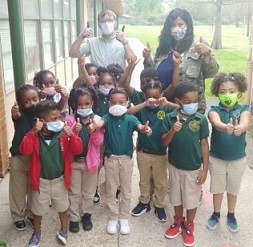Springing into Gardening at J. K. Haynes Charter School

BatonRouge, LA - SU Ag Center’s Extension Associate Michael Polite is introducing the young students at J. K. Haynes School in Scotlandville, Louisiana to gardening by way of the “Eradicating Food Deserts in Neighborhoods Through the Development of School Gardens” project.
Since the beginning of the school term, Polite has been implementing a weekly introduction level Zoom lecture with Chimera LuShaw’s kindergarten class. By using past material, he has been able to track the retention level of the new and old information. “The young gardeners are very excited to greet me on their screen as they eat their lunch every Friday, nourishing their mind, bodies, and souls,” said Polite.
To begin the virtual lesson, the students discuss “what is for lunch?” and recall the six flavor descriptors (Salty, Umami, Sweet, Sour, Bitter, and Spicy). “As we talk about what’s on the plate, I also help the students visualize where and how some of the food items originate in addition to thanking the people whose job it is to create these things for us,” stated Polite. “I utilize the STEAM approach to introduce topics by reciting poetry about the seasons, showcasing paintings of my favorite fruit, using theatrics to make information entertaining, and singing songs about hot peppers. Repetition is key for our young learners,” he added.
Some of the topics covered with the students were Patterns: Weather and Life cycle of Plants; Flowers, Fruits, and Flavors; Birds, Bees, and Butterflies: the importance of Pollinators; and What’s Inside? A peek into Louisiana’s top farming crops.
In addition to the lectures, videos are also used to reinforce the day’s material.
During the month of February, Ms. LuShaw allowed the students to start sowing seeds for the spring crop in a window box that was used last year – practicing sustainable gardening by reusing plastics. In March, the East Baton Rouge Parish Schools were moved into Phase 3 which has allowed extension associates to visit the schools in person.
For the students’ first in-person hands-on project, Polite instructed them to grab peat pots in small groups and explained what a peat pot was and how it works. A peat pot is a pressed mold of plant material that will break down over time and won’t hurt the soil. With the help of Ms. Lushaw, Principal Mary Mason, and Polite, every student took a turn performing the steps of transplanting a seedling into the container. Polite put on a pair of gloves to feed each container with an organic vegetable fertilizer and explained why it is necessary to wear gloves when working with chemicals.
The students were then allowed to go outside and water their plants with the watering can. Using the remainder of his time, Polite brought a hummingbird feeder and some nectar so the students could see a real hummingbird in their garden as mentioned in the lecture on “Bees, Birds, and Butterflies.” Ms. Lushaw instructed the students on how hummingbirds feed and fly around, she later hung the feeder with the students in the garden.
Ms. LuShaw also demonstrated the parts of a bolted mustard growing in the garden and explained why the plant can no longer be eaten; because of its bitter taste due to bolting. Polite added that while you wait to put in plants for the spring after the last frost, it is okay to leave the flowers there. Pollinators will feast on the early flowers of spring and you can harvest the seeds for the next Fall season’s crop.
“The students have read a book about Seeds in the classroom with Ms. LuShaw and now we are able to help them visualize, with first-hand experience in their own garden,” said Polite. “Watching the students get excited over bolted brassicas showed me how appreciative the young gardeners are of this opportune experience and how excited they will relish the beauty of gardening with a lasting impression. I look forward to sharing the joy of gardening with many more students,” he expressed.
###
